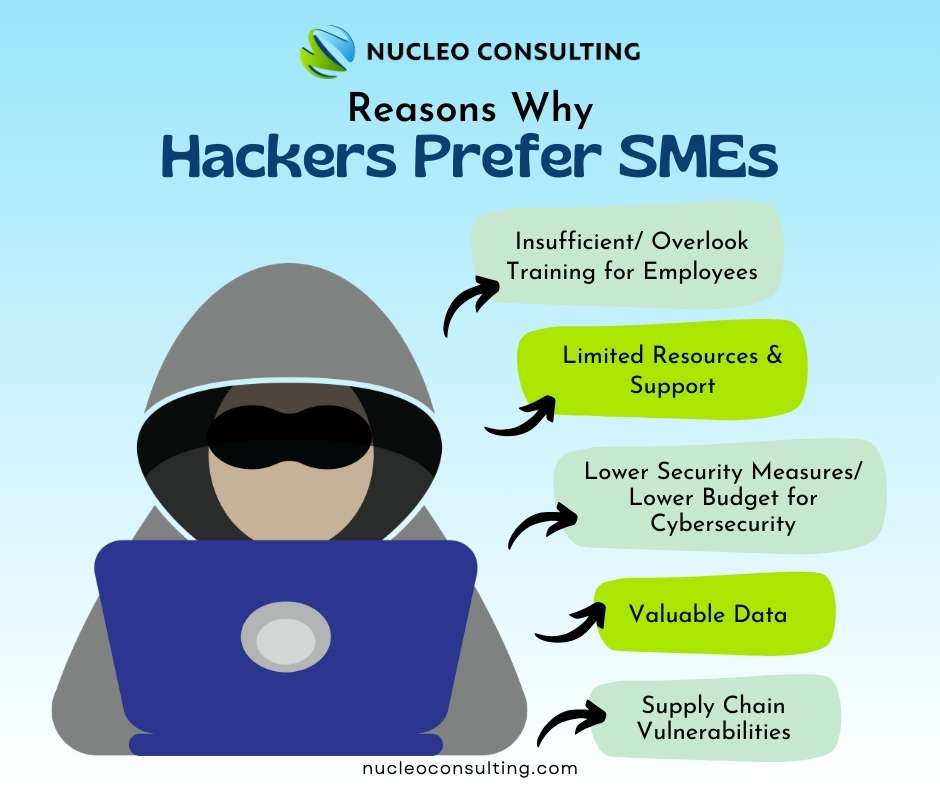[2 mins read]
Small and Medium Enterprises (SMEs) play an important role in Singapore’s business ecosystem. Representing 99% of Singapore’s enterprises, SMEs make significant contributions to our economic development, job opportunities, and catalysts for social improvement. However, along with their strengths lies a vulnerability often overlooked—their attractiveness to cyber criminals.
Despite popular belief, cyber attacks aren’t exclusive to multinational corporations (MNCs). In fact, SMEs have become an increasingly popular target for malicious actors.
The Misconception
There is often a misconception that cyber attackers prefer MNCs due to their organization size and finances. However, this is far from the truth. SMEs are increasingly falling victim to cybercrimes due to several factors that make them a more attractive target.
Here are some reasons why hackers prefer the SMEs:

- Insufficient Training: SMEs often overlook the importance of training or lack of resources to provide comprehensive cybersecurity training to their employees. This leaves staff members unaware of common threats and lack of knowledge to respond to them, making them more likely to be manipulated by cybercriminals. Cyber threats commonly faced by SMEs include phishing scams and social engineering tactics.
- Limited Resources and Support: SMEs often operate on tighter budgets with fewer or no dedicated IT personnel. They may lack the necessary resources and expertise to implement comprehensive cybersecurity measures, making them attractive targets for cybercriminals seeking vulnerabilities to exploit.
- Lower Security Measures: Compared to larger organizations, SMEs often have fewer resources and lower budgets allocated for cybersecurity. This makes them the low-hanging fruit for hackers seeking easy ways to access their network.
- Valuable Data: Despite their size, SMEs handle sensitive information such as customer data, financial records, and intellectual property. This data often holds immense value to hackers, who exploit it for financial gain or to achieve other malicious goals.
- Supply Chain Vulnerabilities: Hackers understand that SMEs are an important part of a bigger network. Hence, by infiltrating an SME, they may gain access to larger enterprises further down the line, making their attacks much more disastrous.
What Hackers Seek
When targeting their victims, cybercriminals have several objectives in mind:
- Financial Gain: Ransomware attacks, data theft, and fraud are common tactics deployed to extort money from vulnerable victims.
- Intellectual Property Theft: Hackers may target organizations to steal valuable information, which they can sell on the dark web or leverage to gain a competitive advantage.
- Network Access: Once inside an organization’s network, hackers may shift to other targets, including partners, customers, or larger enterprises connected to the supply chain.
The Importance of VAPT
Vulnerability Assessment and Penetration Testing (VAPT), often known as pentesting, is a proactive approach to cybersecurity. SMEs should look out for affordable pentesting (VAPT) tool to conduct regular assessments of their IT infrastructure. Regular testing helps businesses to identify and remediate potential vulnerabilities before the hackers do. VAPT helps guide businesses into a better cybersecurity posture, enhance resilience, and safeguard valuable assets against evolving threats.
In conclusion, SMEs must recognize their susceptibility to cyber attacks and take proactive measures to mitigate risks. By investing in robust cybersecurity practices like quarterly penetration testing (VAPT), SMEs can fortify their digital defenses and safeguard their business operations against the ever-evolving cyber threats.
IT Tips | Cyber Threats | Cybersecurity | SME | Cybersecurity Training | Ransomware | VAPT | Pentesting | Data Security | Hackers